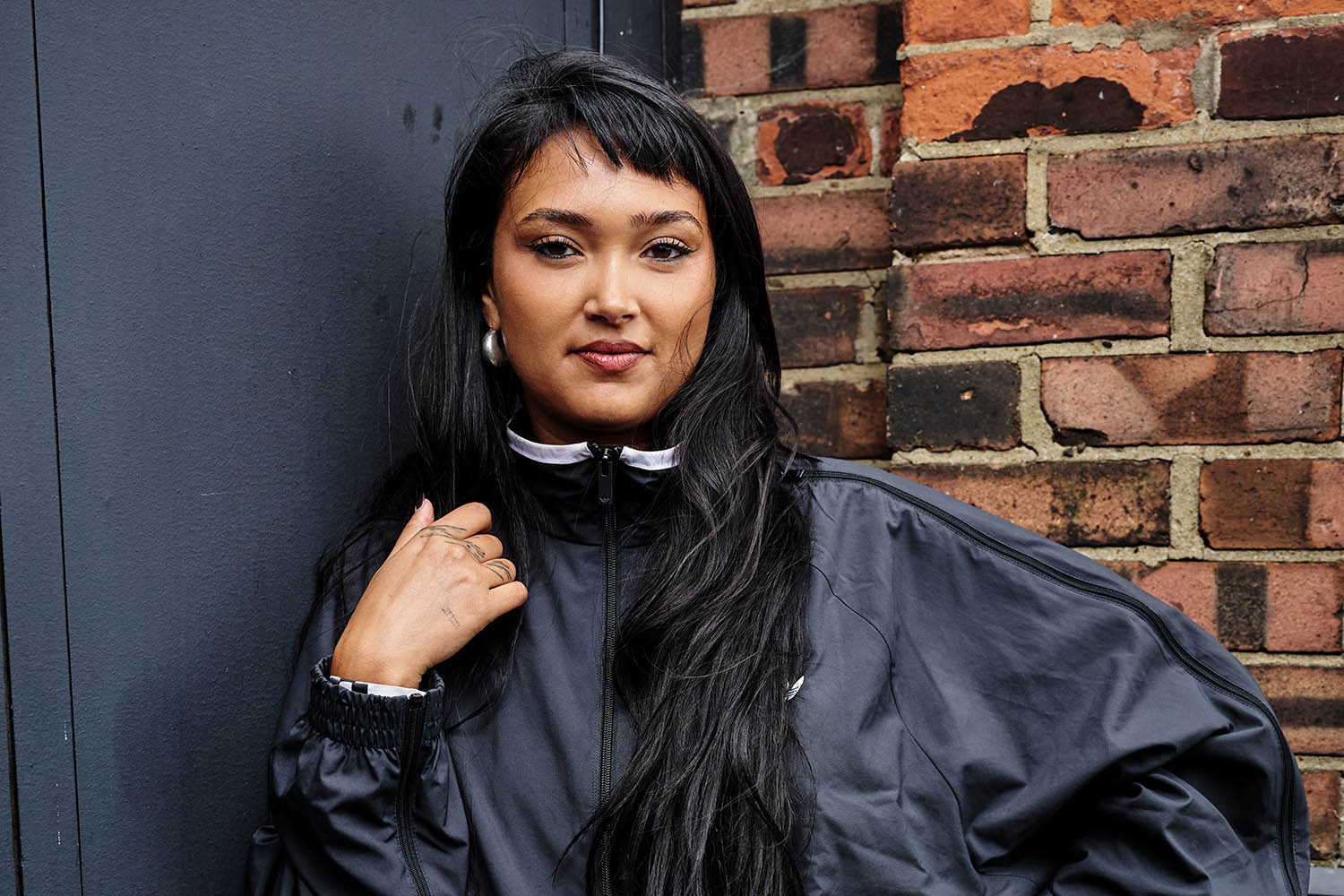Photograph by Danny Kasirye
In a south London restaurant on an overcast summer afternoon, singer-songwriter Joy Crookes is peering out to the streets five floors below us. “You can see my house from up here,” the 26-year-old tells me, jumping to her feet to point down at a terraced row. “I like working here, close to my community. I’m not trying to shit where I eat, but I definitely do, all the time.” She smiles, revealing a delicate tooth-gem, and then gets straight to business.
Crookes released her debut album, Skin, in 2021, when she was 23. Filled with wit on politics, love and London, and set against a backdrop of orchestral neo-soul, jazz and R&B, it was followed by a string of sold-out live shows and nominations for two Brit Awards and the 2022 Mercury Prize.
But once the promotional campaign and tour was over, Crookes was physically and mentally exhausted, and contending with difficulties in her private life. She partied, then burned out. “There were high, amazing times,” she says. “But what came after was a low. I got really sick, basically, and mentally unstable. I had to go on a journey of introspection.” Her upcoming sophomore album, Juniper, was written in the aftermath – a chronological recounting of a kind of quarter-life crisis.
“It needs to be listened to from start to finish,” she says, of the forthcoming album. “I’m not just a musician – I’m a huge fan of music. I swore by the NME growing up and would read about this whole ‘second album fear’. It’s such a relief that this one is done; I really believe the first two are the hardest.” She slips out her phone from the pocket of a black sports jacket, scrolling to find its track-listing, and neatly summarises the record song-by-song.
House with a Pool, for example, is about an abusive ex-partner. “A shit year where I ground myself down into the smallest version of myself,” she says, I Know You’d Kill recounts her escape from their clutches. “I finally saw the support in my life, the people who were genuinely loyal and the relationships that were based on real connection, not manipulation or power dynamics.” There’s rage, insecurity, family rifts, generational trauma, eating disorders, queer love. Her tone, however, is anything but downbeat. “The most surprising thing about me is that my government name is Joy”, she deadpans. Then grins.
The new record is peppered with wry observations, too (“I shine and you get sunburn / That sounds like a you problem” a favourite zinger). In the camp video for recent single Carmen – a lighthearted takedown of unrealistic western beauty standards – Crookes disguises herself as a tree to stalk the blonde-haired woman we’re taught to idealise. In an unfortunate accident the woman loses her head (literally), which Crookes takes home to emulate. The disembodied head ends up in the bin.
Her capacity to poke fun at her struggles suggests she’s moved past them. How does she preserve her positivity? “Therapy. I can afford it now.”
Related articles:
This wasn’t always the case. “From the age of 14 I’d sell my clothes on a weekly basis and save my Eid money in a brown envelope to pay for my sessions. I’ve always been a solutions-based person and I know how to fend for myself. Like, if I was in an apocalypse, I think I’d have a survival plan.” She pauses. “My dad has always said I need to get thoughts out of my body to make sense of them. It’s probably why I’m a songwriter.”
My dad has always said I need to get thoughts out of my body to make sense of them. It’s probably why I’m a songwriter
My dad has always said I need to get thoughts out of my body to make sense of them. It’s probably why I’m a songwriter
Crookes’s face softens when she talks about her music-loving Irish dad and Dhaka-born mother. She was raised between their separate homes, just a few miles from here in Elephant & Castle. “One house you had to take your shoes off,” she says. “The other one you didn’t – you can probably guess which was which.” Every week from the age of four to 18, Crookes’s father would drive her to Irish dance classes in Streatham. If it was sunny, the soft-top of his Peugeot 206 would come down and the stereo switched on: Mazzy Star; King Tubby; ESG. Once Crookes was old enough to buy her own CDs, they’d play them to each other back-to-back, like DJs.
When she was 14, her dad put on Pakistani singer Nusrat Fateh Ali Khan. “Hearing his voice had a profound effect on me,” she says, touching her temples. “Every record that influenced me I heard in that car.” Her tastes have remained expansive since: her love for the Clash is such that, as a teenager, she hyperventilated when she bumped into a slightly confused guitarist Mick Jones on a London street. He couldn’t believe she knew who he was (“I thought you were gonna ask me for directions!”)
Juniper’s striking cover – shot by youth-culture photographer Ewen Spencer at a club in south London, where Crookes is a regular – sees her standing at a sink covered in half-empty plastic cups, looking pensively into a mirror. It’s a callback, she explains, to candid shots taken by friends. “There’s a certain look you give yourself in the toilets on a night out when you’re at your most hedonistic. There’s at least two pictures of me, taken without me realising, where I’m looking into a mirror – not sad, exactly, but reflective. Like my expression could tell a million different stories.” In the cover version, she’s wearing an off-the-shoulder shirt with a warped silhouette by Jamaican-Caymanian designer Jawara Alleyne. “It’s not a particularly ‘fashion’ outfit, and I didn’t want it to be,” she says. “I wanted to feel like I’m on a night out. I wore it again in a club last night, actually, with a bag I bought from a woman in a market. She makes them herself out of the same fabrics used for sails. Mega durable. I looked like a postwoman.”
During promotion for Skin, Crookes’s outfits often honoured her South Asian heritage. Her looks for both the 2020 and 2022 Brit awards (styled by Natalie Roar) included a traditional lehenga and two-piece beaded outfit with a hooded cape, inspired by Bollywood actors Vyjayanthimala and Rekha. Her interest in the intersection of fashion and her work has deepened further in the years since. “Fashion became important to me once I realised there can be an artistic, authentic conversation and connection between music and clothes.”
Are there any designers she’d love to work with? “The list is too long: YSL; Martine Rose; Burberry from a London cultural perspective. Margiela, Ferragamo; Maximillian Davis at Ferragamo… Hold on, who do I fucking love? Oh, Grace Wales Bonner – I really respect how she makes culture and connectivity front and centre.”
Crookes’s look for her slot at Glastonbury this year – she performed on the Other stage – was designed for her by Alleyne and, although not explicitly discussed beforehand, was a tribute to the Palestinian flag. Layers of black, green and red (also, hot pink) were draped across her body, held together with uniform rows of safety pins.
Alongside the dress she wrapped a keffiyeh around her mic stand and dedicated her song Forever to the people of Palestine, to roars from the Sunday afternoon crowd. She’s performed at charity fundraisers and been vocal about the humanitarian crisis in Gaza before. Was the decision to speak out ever difficult? She doesn’t blink, her response clear and unequivocal: “I’m brown. I’m Irish. It would be absolutely fucking insane if I wasn’t interested in taking a position on a genocide. How am I going to cite Nina Simone and Sinéad O’Connor as my favourite female artists and then be apathetic?” She’s incredulous at the idea of staying silent. “I couldn’t sleep at night. I’m ashamed of people in my industry that have decided to be complicit.” And repercussions? “The human condition is to be worried that you’ve said or done the wrong thing,” she says. “There’s definitely been stressful times when I’ve felt alone and scared, but rage overtook the fear.”
Today, Crookes is in a positive place. She’s proud of Juniper, looking forward to her November tour, and hyped about her first acting role, playing the lead character’s sister in a BBC & BFI film called Ish. “It was one of the most cathartic experiences of my life,” she recalls of acting. So does she feel that she’s come out the other side of this record’s challenging chapter? “Definitely. That’s what the third album will be about. And the fourth, and the fifth…” More releases are planned. “Every single day, even if you’re not writing music, is dedicated subconsciously to the next body of work.”
She prefers to think of this album as ending with an ellipsis, rather than a full stop. “Musically,” she explains, “it’s a cliffhanger, because it goes out on a chromatic scale. But also, lyrically, you don’t quite understand the close either – I don’t want to understand it.” How come, I ask? She smiles. “Well, because it isn’t the end”.
Juniper is out on 19 September with Insanity Records
Newsletters
Choose the newsletters you want to receive
View more
For information about how The Observer protects your data, read our Privacy Policy



